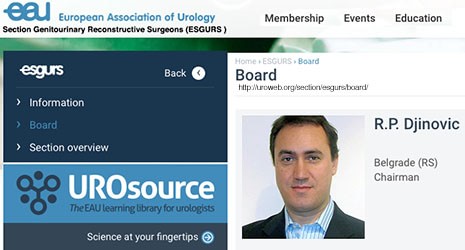Urology Questions About Hypospadias Repair Answered
Introduction
… 3-4% incidence of minor complications.”
Urogenital Reconstructive Surgeon Dr Rados Djinovic is leader of the Sava Perovic Surgical Team and Chairman of the Sava Perovic Foundation. He is a leading expert on all of the 70+ surgical procedures in the field of urogenital-genitourinary reconstructive surgery.
Here are his answers to questions from patients and the parents of infants with hypospadias. Topics include hypospadias surgery success rate, complications, risks, and the surgical procedures he uses for hypospadias treatment of infants and adults.
Questions and Answers
Our son has not had any vaccinations at all. What vaccinations must we do before the hypospadias repair?
“All standard vaccinations.”
What kind of hypospadias surgery techniques do you use?
“No single technique. We use what we have to make a normal penis, depending on the individual case. I decide during the surgery.”
Note: Sava Perovic Surgical Team's results are not easily or quickly achieved. They are based on Professor Perovic's 38 years of experience performing more than 20,000 operations for men, women, boys and girls, young and old patients — many with the most complicated and supremely challenging urogenital problems made much worse by bad previous surgery.
Sava Perovic Surgical Team has always done more than 70 other complex and challenging urogenital procedures that cover the full range of genito-urinary problems, not only all types of hypospadias repair but also bladder exstrophy repair, epispadias repair as well as hypospadias fistula repair.
That enabled the Professor to create his Perovic Art of Urogenital Surgery, an innovative blend of urology, reconstructive surgery and plastic surgery — the first MMA — “mixed medical arts”.
How many hypospadias repairs do you perform monthly?
“Too many …”
Note: That is not being evasive, it is too true.
The Sava Perovic Surgical Team does as many as 60 surgeries per month, up to 17 hours per day, and some procedures take 10 hours each.
We do too many procedures and too much surgery but so many people need help. We do not want to turn anyone away but can accept only about 1 in 6 people asking for surgery.
Dr Djinovic probably does more hypospadias repair procedures than any other surgeon and any other specialized center in the world.
And he corrects the widest variety of hypospadias (all) as well as the many associated conditions, syndromes, defects, abnormalities and problems of the urogenital system.
Professor Perovic and the Sava Perovic Foundation have always been primarily concerned about achieving supreme quality surgical results for the patient — not about collecting statistics to impress anyone.
Dr Djinovic is already one of the world's most experienced urogenital reconstructive surgeons with more than 24,000 hours surgical experience in the past decade alone since joining Dr Perovic's Team. That does not include the four years Dr Djinovic did surgery before that.
Each year he gains more than 2,000 additional hours of extremely advanced surgical experience. Dr Djinovic's statistics would compare favorably with any surgeon and any specialized center anywhere in the world but he is not in a competition and has no interest in compiling statistics to impress anyone. He only wants to help people. He competes on quality of surgical results for the patient, not on numbers of procedures.
In March 2015 in Madrid at the 30th annual meeting of the 43-year-old European Association of Urology (EAU) — the largest urology meeting in the world — the more than 12000 participants from 117 countries elected Dr Djinovic as the Chairman of the EAU’s Genitourinary Reconstructive Surgeons Section (ESGURS).
The prestigious EAU is the leading authority on urological practice, research, continuing medical education and certification in Europe, representing urology professionals worldwide. It’s mission is to raise the quality of urological care in Europe and the world by promoting professionalism and competence among its members.
The EAU is strong about reconstructive surgery — and substantially less influenced by medical device manufacturers (lobbyists) than the American Urology Association.

It is great news for all patients that the EAU has officially and formally adopted the mission and goals of the late Dr Sava Perovic and his Foundation that continues his work.
Our son has a hemangioma (benign tumor of blood vessels) on his arm. Is it a contraindication to the surgery? Is it necessary to remove it before the surgery?
“It does not have anything to do with hypospadias. In most of the cases, it disappears spontaneously and should NOT be operated.”
What is your success rate and hypospadias repair complications rate?
“Success is close to 100%. Complications … approximately 5% — fistula or stricture.” (mid-2014)
Note: Only some of Dr Djinovic's patients are "primary" case — the first time the person is getting surgery.
Many of our patients have had one, two, four, nine up to as many as 22 previous bad surgeries by other doctors all over the world that failed to solve the original problem and, instead, added to it, making correction significantly more difficult and challenging. That makes his success and complications rates even more remarkable.
Our son will soon be 2.1 years old. Is this age OK for surgery or would you recommend to repair his hypospadias as soon as possible?
“That age is quite OK.”
Can you do peno-scrotal hypospadias repair surgery in one step?
“Of course.”
Based on the provided photos, what are the chances of complications and bad consequences (percentages)?
“3-4% incidence of minor complications.” (25 May 2015, down ↓ from one year ago)
What kind of anesthesia do you use? I'm very worried about it because I heard that anesthesia influences the child's brain development.
“Nonsense. All surgical procedures for children are done under general anesthesia.”
What will be the duration of the hypospadias operation?
“About two hours.”
Do we need to have any ultrasound analyses with us or will we get that done at the hospital when we go for surgery? What is the price?
“NO ultrasound needed.”
Design, architecture, content © Copyright 2011-2016 Red Hare Communications ®